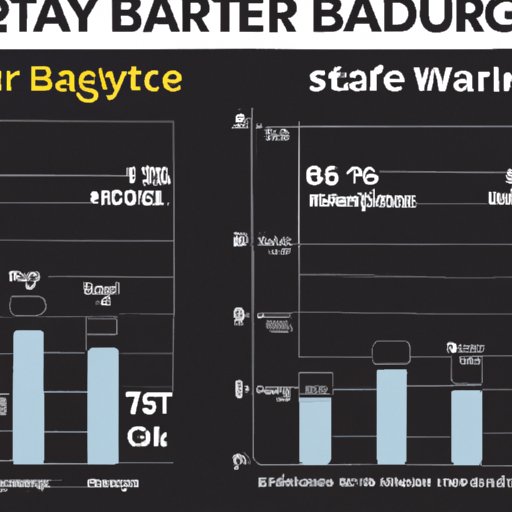Introduction
When it comes to hospitality jobs, bartending is one of the most sought-after positions. Being a bartender can be exciting, fast-paced, and rewarding. But how much does a bartender make? The answer depends on a range of factors, including location, experience, and special skills. In this guide, you’ll learn about the average bartender salary and hourly wage rates in the US, what factors impact a bartender’s pay, and how to earn more money as a bartender.
Definition of a Bartender
A bartender is a professional who serves alcoholic drinks and non-alcoholic beverages at bars, restaurants, and other establishments. They are responsible for taking orders, pouring drinks, making recommendations, and providing excellent customer service. Additionally, they must keep their bar area clean and well organized, which includes stocking supplies and handling cash transactions.

Overview of the Average Bartender Salary and Hourly Wage Rates in the US
According to the Bureau of Labor Statistics (BLS), the median annual wage for bartenders was $25,510 in May 2020. This means that half of all bartenders earned more than this amount, while the other half earned less. The median hourly wage for bartenders was $12.26. The highest 10% of earners made more than $42,450 per year, while the lowest 10% earned less than $18,620.
What Factors Impact a Bartender’s Pay?
Several factors can affect a bartender’s salary, including:
Location
Where you work as a bartender can have a big impact on your pay. For instance, according to BLS data, the District of Columbia had the highest median annual wages for bartenders in 2019 ($37,230). Other top-paying states included Washington ($35,170), Hawaii ($34,650), Nevada ($32,920), and Alaska ($31,830). On the other hand, Mississippi had the lowest median annual wages for bartenders in 2019 ($19,780). Other low-paying states included Arkansas ($20,250), West Virginia ($20,870), South Dakota ($21,150), and Montana ($21,520).
Experience
As with many professions, bartenders tend to earn more as they gain more experience. According to PayScale, the average bartender salary increases with experience, from $9.11 per hour for those with less than 1 year of experience to $14.59 per hour for those with 10 or more years of experience.
Education
Although formal education is not required for bartenders, some employers may prefer applicants who have completed a bartending program or certificate course. These courses can help bartenders learn the basics of bartending, such as pouring techniques, drink recipes, and customer service skills.
Special Skills
Some bartenders may also earn higher wages if they possess special skills, such as knowledge of foreign languages or mixology. Bartenders with these skills can often command higher wages, especially in high-end establishments.
What States Pay Bartenders the Most?
Highest Paying States
The top five highest-paying states for bartenders in 2019 were:
- District of Columbia ($37,230)
- Washington ($35,170)
- Hawaii ($34,650)
- Nevada ($32,920)
- Alaska ($31,830)
Lowest Paying States
The five lowest-paying states for bartenders in 2019 were:
- Mississippi ($19,780)
- Arkansas ($20,250)
- West Virginia ($20,870)
- South Dakota ($21,150)
- Montana ($21,520)

How to Earn More Money as a Bartender
If you’re looking to boost your earnings as a bartender, there are several steps you can take. Here are some tips for earning more money as a bartender:
Increase Your Hours
One way to increase your earnings is to work additional hours. Many bartenders work part-time, but taking on extra shifts can help you earn more money. You may also have the opportunity to pick up additional shifts if another bartender is out sick or on vacation.
Take on Additional Responsibilities
You may also be able to earn more money by taking on additional responsibilities, such as managing the bar or training new staff members. Some employers may offer higher wages for these roles.
Pursue Career Advancement Opportunities
Many bars and restaurants offer career advancement opportunities for bartenders. If you’re interested in taking your career to the next level, look for opportunities to move up within the company. Some employers may even offer bonuses or raises for taking on additional responsibilities.
The Pros and Cons of Being a Bartender
Pros
Being a bartender has its perks. Here are some of the benefits of working as a bartender:
- Flexible schedule: Many bartenders work part-time or flexible hours, which can be beneficial for those with other commitments.
- Tips: Bartenders often receive tips from customers, which can provide an additional source of income.
- Opportunities for growth: Working as a bartender can provide opportunities for career advancement and higher wages.
Cons
Of course, there are also drawbacks to being a bartender. Here are some of the potential drawbacks of working as a bartender:
- Long hours: Working as a bartender can be physically demanding, and shifts can be long and tiring.
- Low wages: The average bartender salary is lower than the national average.
- Customer interaction: Bartenders must be able to handle difficult customers and manage stressful situations.
Tips for Successful Bartending
If you’re considering becoming a bartender, here are some tips for success:
Learn the Basics
Before you start your job, make sure you understand the basics of bartending. This includes learning about different types of drinks, proper pouring techniques, and safe alcohol service.
Develop Your Interpersonal Skills
Good interpersonal skills are essential for bartenders. Make sure you are comfortable interacting with customers, handling difficult conversations, and providing excellent customer service.
Stay Organized
Bartending can be a fast-paced job, so it’s important to stay organized. Make sure you are able to keep track of orders, stock supplies, and handle cash transactions quickly and efficiently.

How to Find a Bartending Job
If you’re looking for a bartending job, here are some tips for finding the right position:
Networking
Networking can be a great way to find a bartending job. Reach out to friends, family, and colleagues who may be able to connect you with potential employers.
Online Applications
Many bars and restaurants now accept online applications. Check job boards and company websites for open positions.
Agencies
You may also want to consider applying through staffing agencies, which can match you with potential employers. Be sure to research the agency before submitting your application.
Conclusion
Bartending can be an exciting and rewarding job, but it’s important to understand the factors that impact a bartender’s salary. Location, experience, and special skills can all have an effect on a bartender’s wages. Additionally, it’s important to have the right skills and knowledge to be successful as a bartender. With the right preparation, you can find the perfect bartending job and start earning the wages you deserve.
(Note: Is this article not meeting your expectations? Do you have knowledge or insights to share? Unlock new opportunities and expand your reach by joining our authors team. Click Registration to join us and share your expertise with our readers.)
